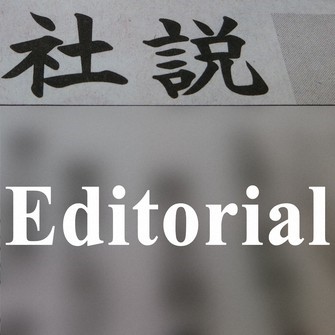
February 10, 2021
February 9, 2021 (Mainichi Japan)
Japanese government- and Olympic-related groups have voiced support in unison for Tokyo Games committee chief Yoshiro Mori's decision to remain in his position even after he came under fire for saying "meetings involving many women take time." This is an astonishingly tone-deaf response.
Prime Minister Yoshihide Suga told a recent Diet session that he did "not have authority to demand his (Mori's) resignation" as if this issue didn't concern him. The International Olympic Committee also expressed its view that the matter is "closed" as Mori has apologized over his gaffe.
However, this is not a matter of a retraction or an apology. The Olympic Charter bans all forms of discrimination. We cannot tolerate having someone who has a mindset contradicting the charter as the head of the Tokyo Organising Committee of the Olympic and Paralympic Games. Mori should resign.
An online petition protesting against Mori's refusal to quit has collected more than 130,000 signatures. Embassies of European countries in Japan have sent out messages condemning discrimination against women. The Tokyo Metropolitan Government has received a flood of protest calls, and many people are withdrawing from volunteer work for the Tokyo Games.
Despite all this, those involved with the games have settled on retaining Mori likely because they are prioritizing bringing the matter under control as we are less than six months away from the scheduled opening of the event.
The issue at hand has also raises questions over how Japanese society, which is deeply male-dominated and celebrates an ostrich policy, functions.
More than 20 years have passed since the Japanese government started promoting gender equality. However, Japan ranks 121st out of 153 countries in the World Economic Forum's Global Gender Gap Report. Women have little opportunities in political and economic fields, and their status and pay remain low. This has led to an "unconscious bias" that women are not suited for leadership positions.
In Japan, only a few selected women can participate in decision-making, and if they voice their opinion, they get labeled as "not knowing their place."
A study conducted overseas showed that companies with higher rates of female executives perform better. Innovative ideas are rarely born in a homogenous group.
So why does Japan remain in the status quo, while there is shared understanding over the importance of diversity? Isn't it a result of people giving up on voicing their opposition against anachronistic leaders' problematic behavior by repeatedly coming up with excuses such as "they cannot be replaced" or "it can't be helped"?
The women who called for the aforementioned petition said they wanted to end this kind of issue in their generation.
What is being questioned is whether Japanese society can turn this matter into an opportunity for transformation.
© Baseball Federation of Asia. All RIGHTS RESERVED. / PRIVACY POLICY